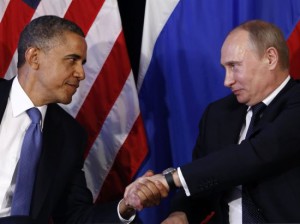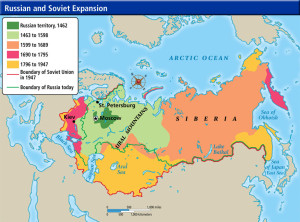by Walter Laqueur
It is common knowledge that relations between America and Russia have deteriorated very much. A debate is now under way in Washington what US policy towards Russia should be. When President Obama was elected he made it known that a “reset” (improvement of relations) was high on his list of priorities. He certainly did try but success escaped him. Why? According to the official Russian version it’s because Washington tried constantly to harm Russia in every possible way. The political elite ruling Russia at present (many of them from the ranks of KGB) had been educated in the belief that America was Russia’s eternal enemy and that American leaders almost without exception were involved day and night in intrigues aiming at the destruction of Russia. America was responsible for the collapse of the Soviet Union 25-30 years ago and it now wanted to finish the job so that Russia would cease to be a factor of any importance in world affairs.

It is an interesting theory but is it true? The attitude of Washington towards Russia as the was not of relentless hostility, it was one of massive lack of interest. This could be observed on every level from top to bottom. It was true with regard to the economy: Russia comes only in 20th place as America’s trading partner. It was true in the academic world: Up to 1990 there had been great interest in Russia in the universities, many research centers, great number of students studying the Russian language and Soviet affairs. But after 1990 intelligent and ambitious young people were advised not to go into the Russian field—it was not good for their career. In Washington among the foreign policy experts there was the conviction that Russia was no longer important, in contrast to China it was a spent force. In brief, Russia as far as America was concerned was not the victim of diabolical intrigues but of lack of interest and neglect which eventually led to illusions and misjudgments on the part of the president and many policy makers. Even a year ago illusions about Russia were widespread.
It was not understood that while Russia had lost its empire, it was only natural that the attempt would be made to regain as much as possible once Russia’s economic and political position would improve. As American ideas about Russia proved to be wrong, following the re-conquest of the Crimea and the fighting in the Ukraine the mood changed to disappointment and even the conviction (according to recent public opinion polls) that Russia was America’s main enemy. This had not been the case during the previous thirty years.
Hence the present debate: What to do about Russia? According to one school of thought Russia must be resisted. The Crimea might be lost, but Ukraine should be helped to maintain its independence. But there is also another school arguing that it would be a basic, perhaps fatal mistake for America after Afghanistan and Iraq to get involved in yet another war which would not be won and in which no major American national interests were at stake. Such views come from the extreme left and the far right, from the so-called realistic school of politics and from some believed to be agents of influence or people with an material interest in serving the Kremlin. Their arguments are quite strong, the price which might have to be paid for an American intervention even if only indirect, could be very high and there is little enthusiasm IN America for getting involved in another small war which could turn into a big War.
But these arguments suffer from one fatal weakness—they do not address the question what the price of American inaction would be. Is the Ukraine (or the Eastern Ukraine) all the Kremlin wants? Or would it be just beginning of the re-conquest of the old empire from Central Asia to the Baltic countries, Moldova and eventually the imposition of governments allied with the Kremlin all over Eastern Europe? Would this not bring about the end of the and the emergence of Russia as the dominant power in Europe?

Nonsense, the “realists” argue, fear mongering. Russia’s ambitions are quite limited and historically perhaps even justified. Present day Russia is very weak economically and also militarily. It has invested much money in rearmament in recent years but the results will be seen only in five or ten years from now. With the bad economic situation (the decline of the ruble and the price of oil) it might well be impossible to keep up the policy of rearmament. Is it conceivable that such a country will engage in dangerous gambling out of a position of weakness? All this is true but whether someone is strong or weak is always a relative statement. It depends on the forces and determination of the other side. If it should appear that the risks involved in expansion are small, there could be a strong temptation to continue the present course of action. Blunt as the Bible says—do not lead us into temptation.
WALTER LAQUEUR is the author of Putinism: Russia and Its Future with the West and served as the director of the Institute of Contemporary History in London and concurrently the chairman of the in Washington for 30 years. He was also a professor at Georgetown University and the author of more than twenty-five books on Europe, Russia, and the Middle East. He has had articles published in The New York Times, The Washington Post, and countless other newspapers worldwide. His books include The Last Days of Europe and After the Fall.
